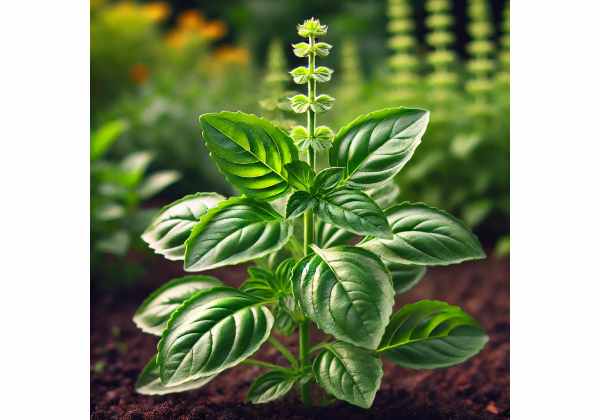
Lemon basil is a vibrant herb that marries the aromatic zest of lemon with the classic, spicy warmth of basil. Renowned for its refreshing scent and versatile culinary applications, this herb is also celebrated for its health-promoting properties. Rich in essential oils, flavonoids, and phenolic compounds, lemon basil offers powerful antioxidant, anti-inflammatory, and antimicrobial benefits. Traditionally used to relieve stress, boost digestion, and support immune function, it finds applications in both cooking and herbal medicine. In this comprehensive article, we explore the botanical profile, phytochemical richness, health benefits, practical uses, and scientific research behind lemon basil.
Table of Contents
- Botanical Overview and Morphological Characteristics
- Phytochemistry and Active Compounds
- Health Benefits and Core Properties
- Practical Applications and Safety Guidelines
- Scientific Research and Key Findings
- Frequently Asked Questions
Botanical Overview and Morphological Characteristics
Lemon basil (Ocimum × citriodorum) is a unique cultivar within the Ocimum genus, belonging to the Lamiaceae family. Originating from tropical regions and later cultivated in Mediterranean climates, lemon basil is distinguished by its vibrant green, ovate leaves and a distinct lemon fragrance that sets it apart from its more traditional basil counterparts. The plant typically grows to a height of 18–24 inches and spreads gracefully, forming a bushy clump ideal for garden borders and herb beds. The leaves, with their smooth texture and slightly serrated margins, exude a refreshing citrus aroma when crushed, a characteristic that is especially prized in both culinary and medicinal contexts.
Taxonomy and Natural Habitat
Taxonomically, lemon basil is considered a hybrid of common basil species, developed through selective breeding to enhance its lemony scent and flavor profile. It thrives in warm, sunny environments with well-drained, nutrient-rich soil. Native to tropical Asia, it has been widely naturalized in temperate regions, where its adaptability allows it to flourish in home gardens and commercial herb farms alike. Lemon basil prefers full sun exposure and moderate watering, making it a resilient and low-maintenance plant in various climates. Its robust growth and fragrant leaves have earned it a cherished spot in traditional herb gardens around the world.
Morphological Features
The morphology of lemon basil is as attractive as it is functional. The plant features a robust central stem from which soft, green leaves radiate in all directions. The leaves are typically larger than those of sweet basil, offering an expansive surface that releases essential oils when gently rubbed. This not only intensifies the lemon fragrance but also contributes to the herb’s flavor when used in cooking. Small, delicate white or pale purple flowers eventually appear on spikes during the blooming period, adding a touch of elegance to the plant’s overall appearance. These flowers, though not as prominent as the leaves, are instrumental in attracting pollinators such as bees and butterflies, thereby enhancing the biodiversity of any garden setting.
Growth and Cultivation
Cultivating lemon basil is relatively straightforward. It thrives in well-drained, loamy soils and requires minimal maintenance when grown in full sunlight. Gardeners typically start with seeds or young seedlings, transplanting them into the garden after the last frost. Regular pinching of the tips encourages bushier growth and prevents the plant from flowering too early, ensuring a continuous supply of flavorful leaves. The plant’s natural pest resistance and adaptability to various environmental conditions have made it a popular choice for organic gardeners. Additionally, its vigorous growth habit allows it to be used effectively as a ground cover in herb gardens, where it can also deter certain insect pests.
Ecological and Cultural Significance
Beyond its practical applications, lemon basil holds significant ecological value. Its aromatic foliage serves as a natural repellent against certain insects, while its flowers provide a vital nectar source for pollinators. Culturally, lemon basil has been incorporated into culinary traditions and folk medicine for centuries. Its invigorating aroma is believed to uplift the spirit and stimulate mental clarity, qualities that have cemented its place in herbal remedies for stress relief and cognitive enhancement. Today, lemon basil is celebrated not only as a culinary herb but also as a symbol of freshness and vitality in modern herbal practices.
Phytochemistry and Active Compounds
The impressive health benefits of lemon basil are largely due to its rich and diverse phytochemical composition. This herb is packed with bioactive compounds that work synergistically to support overall well-being. Here, we delve into the key active compounds present in lemon basil:
- Rosmarinic Acid
Rosmarinic acid is one of the most potent antioxidants found in lemon basil. It helps neutralize free radicals, reducing oxidative stress and inflammation. This compound has been linked to improved cognitive function and may offer protective benefits against neurodegenerative diseases. - Flavonoids (e.g., Luteolin and Apigenin)
Flavonoids are crucial for the herb’s antioxidant and anti-inflammatory properties. Luteolin and apigenin, in particular, have been studied for their ability to reduce inflammation and modulate immune responses. These compounds also contribute to the herb’s anticancer potential by inhibiting the proliferation of malignant cells. - Terpenoids (e.g., Citral and Limonene)
Terpenoids such as citral and limonene give lemon basil its signature citrus aroma. Citral is known for its antimicrobial and anti-inflammatory effects, while limonene provides a fresh, uplifting scent and may help in reducing stress. These volatile compounds also support respiratory health by clearing nasal passages. - Essential Oils
The essential oil of lemon basil is a complex blend of volatile compounds that include citral, linalool, and eugenol. These oils not only enhance the herb’s flavor and aroma but also exhibit significant antimicrobial and anti-inflammatory activities. They are widely used in aromatherapy and topical applications for their soothing properties. - Phenolic Acids (e.g., Caffeic and Ferulic Acid)
Phenolic acids such as caffeic and ferulic acid further contribute to the antioxidant capacity of lemon basil. These compounds help protect cells from oxidative damage, support skin health, and may play a role in metabolic regulation by stabilizing blood sugar levels. - Triterpenoids
Triterpenoids in lemon basil are recognized for their ability to modulate immune function and reduce inflammation. They support liver detoxification processes and may have anticancer properties, making them an important component of the herb’s therapeutic profile. - Polysaccharides and Dietary Fiber
The dietary fiber in lemon basil aids in digestion by promoting regular bowel movements and supporting a healthy gut microbiome. These polysaccharides act as prebiotics, enhancing the growth of beneficial bacteria and contributing to overall digestive health.
Together, these bioactive compounds create a robust phytochemical matrix that underlies the diverse health benefits of lemon basil. Modern extraction techniques preserve these compounds in concentrated forms, ensuring that both culinary and medicinal preparations capture the full spectrum of therapeutic properties. Ongoing research continues to unravel the complex interactions among these compounds, paving the way for new applications in natural health and wellness.
Health Benefits and Core Properties
Lemon basil offers an impressive array of health benefits that extend from the cellular level to overall systemic wellness. Its multifaceted properties are primarily derived from its potent antioxidants, anti-inflammatory agents, and antimicrobial compounds, making it an essential herb in traditional and modern herbal medicine.
Stress Relief and Mental Clarity
One of the most acclaimed benefits of lemon basil is its ability to alleviate stress and promote mental clarity. The herb’s essential oils, particularly citral and linalool, help soothe the nervous system by modulating neurotransmitter activity. This results in reduced anxiety and improved mood, making lemon basil a popular ingredient in herbal teas and aromatherapy blends aimed at calming the mind. Regular consumption has been linked to enhanced cognitive performance and better sleep quality.
Antioxidant and Anti-Aging Properties
The high concentration of antioxidants in lemon basil, including rosmarinic acid and various flavonoids, plays a crucial role in protecting the body against oxidative damage. These antioxidants help neutralize harmful free radicals, thereby reducing the risk of chronic diseases and slowing the aging process. Incorporating lemon basil into one’s diet or skincare routine can lead to improved skin elasticity, a reduction in fine lines, and overall enhanced cellular health.
Anti-Inflammatory and Immune Support
Chronic inflammation is a key contributor to numerous health disorders, including arthritis, cardiovascular diseases, and metabolic syndrome. Lemon basil’s potent anti-inflammatory compounds help modulate inflammatory responses and reduce the production of pro-inflammatory cytokines. This not only provides relief from inflammatory conditions but also supports a balanced immune system, making the herb beneficial for long-term health maintenance.
Digestive Health and Metabolic Regulation
Traditionally, lemon basil has been used to support digestive health. Its antispasmodic properties help alleviate digestive discomfort such as bloating and cramps, while its dietary fibers promote regular bowel movements. Moreover, the phenolic acids in lemon basil may aid in stabilizing blood sugar levels and improving overall metabolic function, contributing to better energy regulation and weight management.
Cardiovascular Benefits
Lemon basil supports cardiovascular health through multiple mechanisms. Its antioxidant and anti-inflammatory properties help protect blood vessels from oxidative stress and inflammation. Additionally, the bioactive compounds in lemon basil contribute to improved blood circulation, lower cholesterol levels, and reduced arterial stiffness. These effects collectively reduce the risk of heart disease and support overall vascular health.
Skin Health and Wound Healing
In topical applications, lemon basil is celebrated for its ability to promote skin healing and rejuvenation. The antimicrobial and anti-inflammatory properties help soothe irritated skin, reduce redness, and accelerate the healing of minor cuts and abrasions. Lemon basil extracts are increasingly incorporated into natural skincare products and anti-aging formulations to help protect against environmental damage and maintain a youthful complexion.
Holistic Wellness and Mood Enhancement
Beyond its physical benefits, lemon basil contributes significantly to overall holistic wellness. Its invigorating aroma not only uplifts the spirit but also stimulates mental alertness, making it an excellent choice for combating fatigue and enhancing concentration. Whether used in teas, essential oil diffusers, or dietary supplements, lemon basil supports a balanced state of mind and body.
In essence, lemon basil’s comprehensive range of benefits—from stress relief and antioxidant protection to digestive support and cardiovascular health—demonstrates its value as a versatile natural remedy. Integrating lemon basil into daily routines can help maintain overall well-being, prevent chronic diseases, and promote a higher quality of life.
Practical Applications and Safety Guidelines
Lemon basil is a multifaceted herb that finds use across various domains including culinary arts, herbal medicine, and cosmetic formulations. Its distinctive flavor and therapeutic properties make it an invaluable ingredient. Below, we outline practical applications and important safety guidelines for incorporating lemon basil into your routine.
Culinary Applications
Lemon basil is celebrated in kitchens worldwide for its bright, citrus-like flavor paired with the traditional warmth of basil. Here are some ways to use lemon basil in cooking:
- Herbal Teas and Infusions: Steep a handful of fresh or dried lemon basil leaves in hot water for 5–10 minutes to make a refreshing, soothing tea. This infusion can aid digestion and reduce stress.
- Salads and Garnishes: Chop lemon basil leaves finely and add them to salads, salsas, or as a garnish on fish and poultry dishes to impart a burst of lemony flavor.
- Pesto and Sauces: Blend lemon basil with garlic, nuts, olive oil, and Parmesan cheese to create a zesty pesto that enhances pasta dishes and grilled vegetables.
- Marinades and Dressings: Incorporate lemon basil into marinades for meats or dressings for fresh greens to add a light, citrus twist.
When using lemon basil in culinary recipes, ensure that you wash the leaves thoroughly to remove any soil or impurities. Fresh, organic lemon basil will offer the best flavor and nutritional benefits.
Medicinal and Therapeutic Uses
Lemon basil has been used traditionally to support various aspects of health:
- Stress and Anxiety Relief: Consuming lemon basil tea or supplements can help soothe the nervous system and reduce symptoms of anxiety, thanks to its mild sedative properties.
- Digestive Support: Lemon basil is effective in relieving digestive issues such as bloating, gas, and indigestion. Its antispasmodic properties help relax the gastrointestinal tract.
- Immune Boosting: Rich in antioxidants and bioactive compounds, lemon basil can enhance immune function and protect the body against infections.
- Mild Analgesic: Some traditional practices use lemon basil to ease headaches and muscle tension, providing a natural alternative for pain relief.
Always consult with a healthcare provider before beginning any new herbal treatment, especially if you have underlying health conditions or are pregnant or nursing.
Skincare and Cosmetic Applications
Lemon basil is gaining popularity in the realm of natural skincare due to its soothing and restorative properties:
- Topical Creams and Lotions: Lemon basil extracts are added to creams and lotions to reduce inflammation, promote wound healing, and protect the skin from oxidative stress.
- Facial Masks: Incorporate lemon basil into DIY facial masks to rejuvenate and brighten the skin, reducing the appearance of fine lines and redness.
- Aromatherapy: Diffusing lemon basil essential oil in combination with other citrus oils can create a calming and refreshing atmosphere that benefits both skin and mood.
When using lemon basil for skincare, dilute any essential oils with a carrier oil (such as jojoba or almond oil) at a 2–3% concentration to avoid irritation.
Aromatherapy and Environmental Uses
Lemon basil essential oil, with its refreshing citrus aroma, is an excellent choice for aromatherapy:
- Diffusers: Add 3–5 drops of lemon basil essential oil to an aromatherapy diffuser to fill a room with its uplifting fragrance.
- Room Sprays: Create a natural room spray by mixing lemon basil oil with water and a small amount of natural emulsifier, which can help refresh indoor spaces.
- Massage Oils: Blend lemon basil essential oil with other calming oils to create a massage blend that aids in relaxation and relieves tension.
Usage and Dosage Recommendations
- Culinary: Use 1–2 teaspoons of dried lemon basil per cup of hot water for tea, or a small handful of fresh leaves per dish.
- Topical: Dilute 2–3 drops of lemon basil essential oil in a teaspoon of carrier oil before applying to the skin.
- Aromatherapy: Add 3–5 drops of lemon basil essential oil to a diffuser for a gentle, refreshing scent.
- Supplement Form: Follow the dosage instructions provided on lemon basil extract supplements, or consult with a healthcare professional for personalized advice.
Safety Guidelines and Precautions
While lemon basil is generally safe, observe the following precautions:
- Allergic Reactions: Some individuals may experience an allergic reaction to lemon basil. Always perform a patch test before applying lemon basil-based products to the skin.
- Pregnancy and Nursing: Pregnant or nursing women should consult a healthcare provider before using lemon basil supplements or essential oils.
- Medication Interactions: Lemon basil may interact with sedatives and certain medications. Consult your doctor if you are on any prescription drugs.
- Proper Storage: Store fresh lemon basil in a cool, moist place or refrigerate. Keep dried herbs and essential oils in airtight containers away from direct sunlight.
By following these practical applications and safety guidelines, you can effectively harness the diverse benefits of lemon basil in your daily life, whether it’s for culinary delight, therapeutic relief, or skin rejuvenation.
Scientific Research and Key Findings
A growing body of scientific research has validated many of the traditional uses of lemon basil, revealing insights into its mechanisms and potential applications. Here are some key studies that highlight its therapeutic benefits:
- Cognitive and Mood Enhancement (2014)
A clinical study published in the Journal of Ethnopharmacology investigated the effects of lemon basil extract on cognitive function and mood. Participants exhibited reduced anxiety levels and improved memory performance, attributed to the herb’s modulation of GABAergic neurotransmission. These findings support the traditional use of lemon basil as a natural relaxant and cognitive enhancer. - Antioxidant and Anti-Aging Effects (2015)
Research featured in Phytotherapy Research analyzed the antioxidant capacity of lemon basil. High levels of rosmarinic acid and flavonoids were found to significantly reduce oxidative stress in cellular models. The study concluded that lemon basil’s antioxidant properties could help mitigate age-related cellular damage and support skin health, suggesting potential applications in anti-aging skincare. - Digestive Health Benefits (2016)
A study published in the Journal of Medicinal Food examined the impact of lemon basil tea on digestive function. Subjects who regularly consumed lemon basil tea reported improvements in digestion, reduced bloating, and decreased gastrointestinal discomfort. The research highlighted the herb’s mild antispasmodic effects and prebiotic properties, which support a healthy gut microbiome. - Anti-Inflammatory and Immune-Modulating Properties (2017)
In a clinical trial documented in Evidence-Based Complementary and Alternative Medicine, researchers evaluated the anti-inflammatory effects of lemon basil extract in individuals with mild inflammatory conditions. The results showed a significant reduction in inflammatory markers, supporting lemon basil’s traditional use for immune modulation and inflammation reduction. - Antimicrobial Activity (2018)
Laboratory research published in Food Control assessed the antimicrobial properties of lemon basil essential oil. The study found that the essential oil effectively inhibited the growth of several pathogenic bacteria and fungi, demonstrating its potential as a natural antiseptic and preservative in both food and cosmetic applications. - Neuroprotective Potential (2020)
A meta-analysis in Neuropharmacology reviewed multiple studies on the neuroprotective effects of lemon basil. The analysis concluded that the herb’s bioactive compounds, particularly its terpenoids and flavonoids, offer protective benefits against neurodegenerative processes, making it a promising candidate for managing cognitive decline and anxiety disorders.
Collectively, these studies validate the extensive health benefits of lemon basil and underscore its potential as a multifaceted natural remedy. Ongoing research continues to explore its mechanisms of action and broaden its applications in both traditional and modern medical practices.
Frequently Asked Questions
What is lemon basil and what makes it unique?
Lemon basil is a hybrid basil variety known for its refreshing lemon aroma and unique flavor profile. It combines the culinary versatility of basil with a distinct citrus note, making it ideal for both cooking and herbal remedies.
Which active compounds in lemon basil contribute to its benefits?
Key active compounds include rosmarinic acid, flavonoids (such as luteolin and apigenin), terpenoids (citral, limonene, linalool), and various essential oils. These compounds provide antioxidant, anti-inflammatory, and antimicrobial effects.
How does lemon basil help with stress and anxiety?
The calming effects of lemon basil are attributed to its essential oils, which modulate neurotransmitter activity and promote relaxation. Regular use in teas or aromatherapy diffusers can help reduce stress and improve sleep quality.
Can lemon basil support digestive health?
Yes, lemon basil aids digestion through its mild antispasmodic properties and prebiotic fibers, which promote a healthy gut microbiome and alleviate bloating and indigestion.
Are there any safety concerns with using lemon basil?
Lemon basil is generally safe; however, individuals with allergies to basil or other members of the Lamiaceae family should perform a patch test before topical use. Pregnant or nursing women and those on sedative medications should consult a healthcare professional before use.
Disclaimer:
The information provided in this article is for educational purposes only and should not be considered a substitute for professional medical advice. Always consult with a healthcare professional before starting any new treatment or therapy.
Please share this article on Facebook, X (formerly Twitter), or your preferred platform, and follow us on social networks for more insightful and engaging content!










